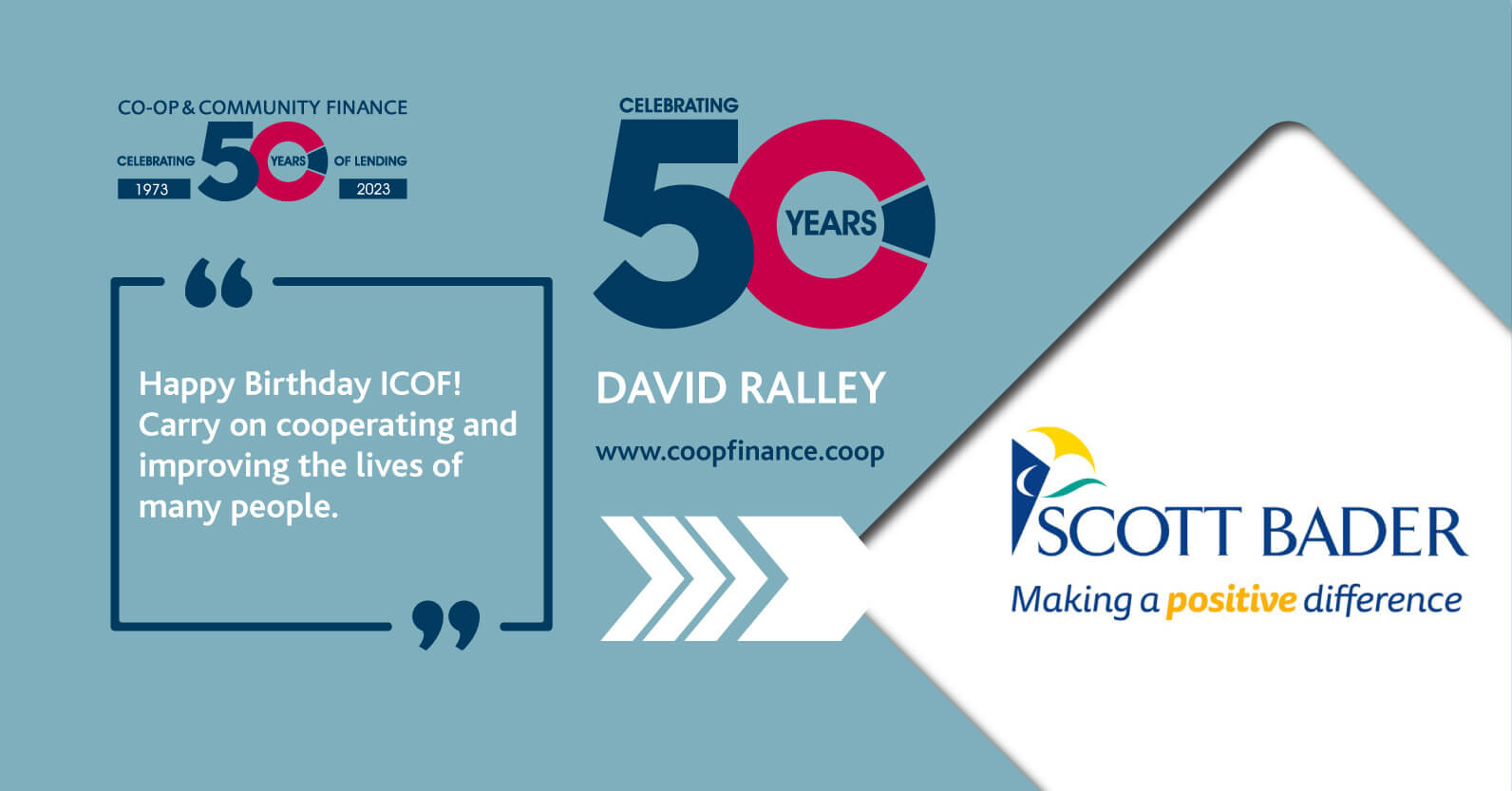Fifty years of friendship and finance – meet David Ralley
We’ve been celebrating our fifty years of friendship and finance by talking to the people who have worked with us along the way. Today we meet David Ralley, whose ICOF story goes back to our very beginning
“Ernest Bader had built a successful chemical company. It was called Scott Bader as Dora Scott, his wife, had given him £300 to start it. Bader had ideas about industry and how people had been let down by it, and so he gave the business to the employees under terms of Common ownership, forming the Scott Bader Commonwealth in 1951. Anyone who worked at Scott Bader could apply for membership, and it wasn’t compulsory.*
As part of its structure, the Commonwealth had a body entitled The Commonwealth Board of Management which dealt with membership, charities and the Commonwealth Development Fund. In 1967 I was appointed Secretary, having served on most of Scott Bader Committees, I was also elected its first Worker Director on the company board, it being responsible for the running and results of business (most of which was the Chief Executive and his committee).
Ernest Bader and some of his friends in business, including Roger Sawtell, had created a company called Demintry – The Society for Democratic Integration in Industry. This was subsequently replaced by the Industrial Common Ownership Movement – ICOM.
ICOM was growing and they realised they needed a financial arm so ICOF was created, largely by Roger, with small sums of money. They quickly recognised that they needed more money.
By now, Roger was chair of ICOF and I was the Commonwealth Secretary. We went to the Scott Bader Commonwealth Board of Management and proposed that we process the applications and bring them to Scott Bader for funding. They agreed on condition that the Secretary became a Trustee so I sat in meetings as a Trustee while they sorted out the set up and then I became a Trustee at the first AGM of ICOF – that’s where I started with ICOF.
A group would apply to ICOF Trustees to be funded, they would look at it, run it past me to the Scott Bader Commonwealth Board of Management they’d approve it and I’d take it to members in a general meeting and then ICOF could have the money.
That worked for a number of years, ICOF ended up lending something like £120k that way and I’m fairly sure they wouldn’t have got any money from anywhere else at that stage. They built up a reputation while learning that way, and quickly needed more money as the movement grew and demand grew.
At that time all of a sudden, industry hit the worst time of its life. Small businesses were failing at a terrible rate. In 1990 around 40,000 businesses went down. But there were still lots of new businesses being created and local authorities were looking for job creation schemes – ICOF met that need. We didn’t take personal guarantees.
David Watkins put forward a Private Members Bill – he actually came up with the Common Ownership Act with Roger Sawtell which was passed and provided ICOF with £25k which provided them with a secretary and officer, and gave them recognition and authority. It was murder to administer as the civil servants didn’t like it at all as money went back to ICOF on repayment not the civil service! If a loan was for more than £7,500, the Secretary of State could get involved – ludicrous! So it wouldn’t be a surprise that all our lending came in at about £7,000 *laughs*.
Eventually I left Scott Bader in the 1980s. Before then Roger Sawtell stood down as Chair of ICOF and the Trustees appointed me in his place. Until about 1980 I was still involved in Scott Bader but I’d decided it was time to go, I’d been quite good at knowing when to hold and fold, I was leaving anyway (in my mind) so I was able to go under a round of redundancies.
Shortly after that, I took up the role of full time Secretary of ICOF and gave up Chair, so I was doing a full time job with ICOF and as it developed and met with other bodies, there was lots of growth. We had failures, of course, but they weren’t as bad as the government rate – It cost ICOF £300 a time to create a job, banks providing a similar figure, with first charge of course – and the government charged £3,000 for creating a single job.
In 1987 we decided to set up a share issue, not as a financial investment but as your money doing good work’. The Rules were that we had to have £50k half of which could be the setting up costs. We did not have another £25K so as usual, we went to Scott Bader who lent us the sum. I felt slightly optimistic of raising perhaps £200K. As it was, £560k was raised, It was a real team effort from ICOF.
I’ve watched the development of ICOF over the years and what’s the same today as it was then is that it meets the need – we met the need, with integrity and clarity. I’m delighted with the growth of ICOF, maintaining its co-op principles – and it will always be part of me.
Happy birthday ICOF! Carry on cooperating and improving the lives of many people.”
•Read more about this in The Man Who Gave His Company Away – A Biography of Ernest Bader, Founder of the Scott Bader Commonwealth and Company by Suzanna Coe. It had a foreword by E. F. Schumacher, the German-born British economist who wrote Small Is Beautiful: A Study of Economics As If People Mattered, and was a worldwide publication. It contains a chapter on Scott Bader.

